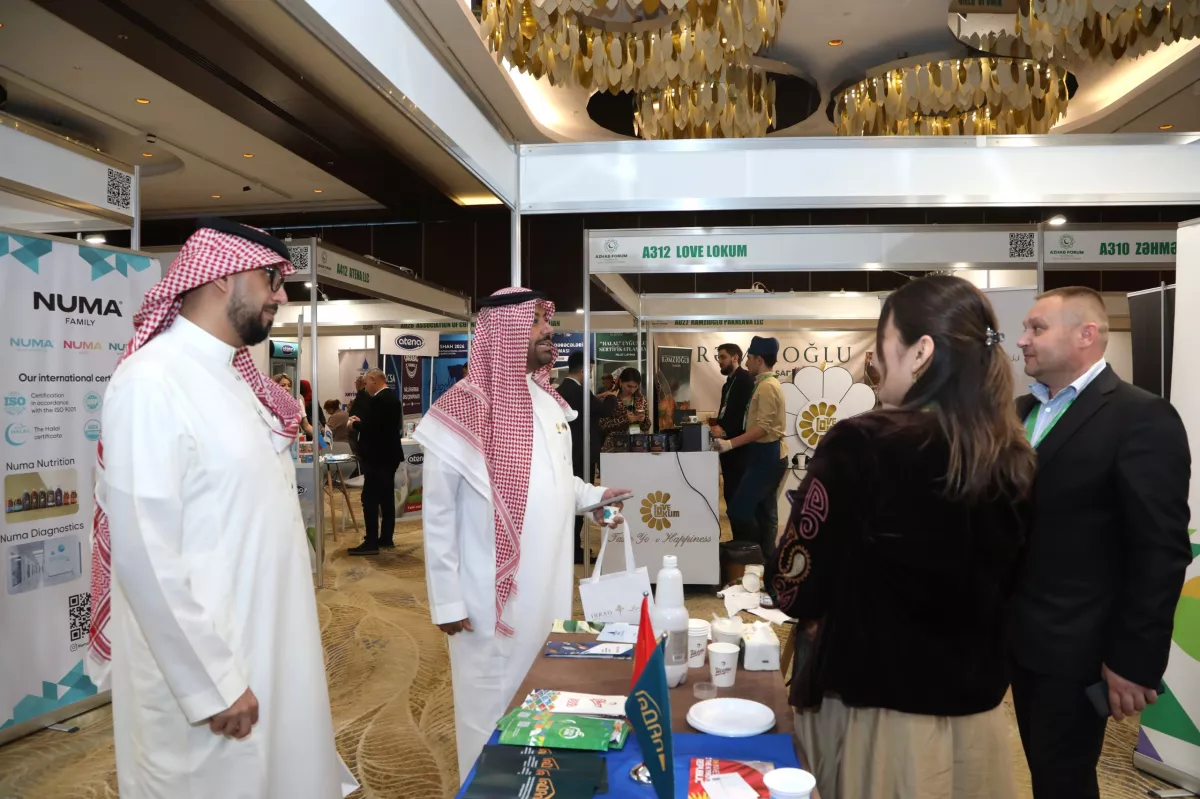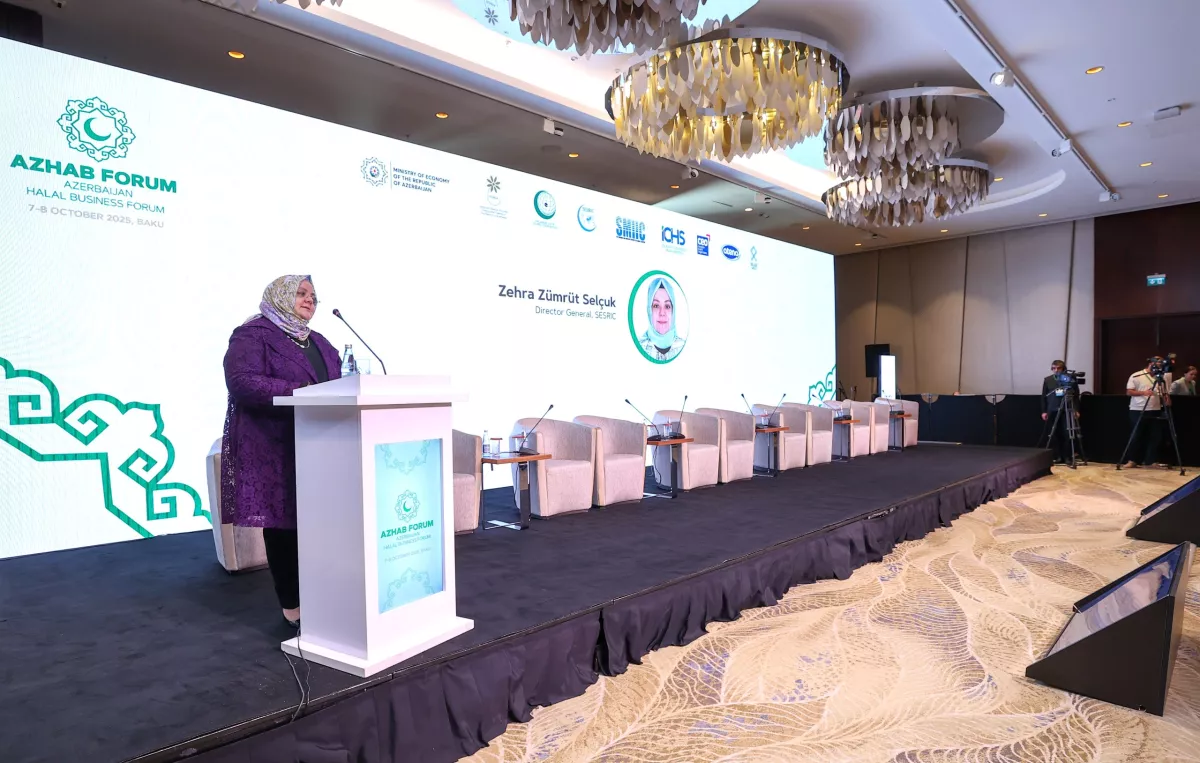Azerbaijan steps into the global halal market A $3 trillion opportunity
The halal food sector is one of the fastest-growing segments of the global food industry today. In Azerbaijan, this market is gradually taking shape, driven by the country’s strategic location and expanding economy—factors that could position it as a key player in the global halal supply chain.
Developing this sector is particularly important for Azerbaijan’s export strategy, as experts predict that the global halal market could approach $3 trillion by 2027. The nation’s potential and international trends in the halal industry were highlighted during the two-day 2nd Azerbaijan Halal Business (AZHAB) Forum, organised by the Agency for the Development of Small and Medium Business (KOBIA) with support from the Ministry of Economy of the Republic of Azerbaijan.
Today, more than fifty countries have Muslim-majority populations, and by early 2025, the global Muslim population has reached nearly 2 billion—about a quarter of the world’s total population. A central aspect of Islamic tradition is the regulation of food consumption, embodied in the concept of “halal.”
Halal primarily prohibits the use of alcohol, pork, animal blood, and certain types of fish (such as those without scales) in food preparation. It also sets strict rules for the slaughter, butchering, and storage of meat from animals and poultry.
In recent years, the halal industry has developed comprehensive standards for industrial food processing, including guidelines for storage and logistics. At the same time, halal producers increasingly prioritise organic raw materials and aim to minimise the use of chemical or synthetic substances in agricultural processing and food production.
Although implementing and strictly adhering to halal food standards can complicate technological processes in mass production, interest in this sector continues to grow each year—not only in countries with long-standing Islamic traditions.
Halal production and stable exports have been successfully established in countries such as Australia, Brazil, New Zealand, India, and several European nations. Over the past year and a half, the post-Soviet region has also joined this trend, particularly Kazakhstan, Kyrgyzstan, and Uzbekistan.
In Azerbaijan, interest in halal food production is steadily growing. Over the past decade, this has been driven in part by demand from tourists from Muslim-majority countries, encouraging the local hospitality sector to adopt halal tourism standards.
Another key factor is the export potential for domestic producers. In recent years, with support from the Azerbaijan Export and Investment Promotion Agency (AZPROMO), local food products have been actively promoted in markets across the Gulf countries, the Middle East, and North Africa. This comes as no surprise, given that the rapidly expanding halal market attracts domestic producers eager to secure a share.
According to the State of the Global Islamic Economy Report, the global halal food market was valued at $500 billion in 2009 and has nearly quintupled to $2.4 trillion in just fifteen years—underscoring both the sector’s impressive growth and its profitability.

“In two years, global spending on halal products will reach nearly $3 trillion, and in the markets of the Organization of Islamic Cooperation (OIC) alone, imports of halal goods are expected to rise from $359 billion in 2022 to around $492 billion by 2027,” said Samer Elesawi, head of the Center of Excellence of the Islamic Development Bank (IsDB) in Kuala Lumpur, during the 2nd AZHAB Forum in Baku. “The halal industry is becoming one of the key drivers of sustainable and inclusive growth for IsDB member countries, opening new opportunities for economic development, attracting investment, boosting trade, and creating jobs.”
The head of the Centre noted that, thanks to its strategic location and growing economy, Azerbaijan is capable of taking a leading position in the global halal supply chain: “The establishment of industrial parks for halal products in the country, along with the development of a certification system, will allow Azerbaijan to strengthen its position in international markets.” In this context, Elesawi congratulated Azerbaijan on the introduction of a new four-category halal certification system and on the accreditation of the Republic of Azerbaijan’s Institute of Standardisation by the Turkish Halal Accreditation Agency.
Looking ahead, Azerbaijan plans further to develop its halal industry in close partnership with Türkiye. The two countries aim to create a joint halal brand, which would help Azerbaijani producers establish supply chains to the highly promising markets of Organisation of Islamic Cooperation (OIC) member states.
“Currently, around 11,000 companies from OIC member countries operate in Azerbaijan, and from January to August 2025, trade between Azerbaijan and OIC countries reached approximately $6 billion,” said Elnur Aliyev, Azerbaijani First Deputy Minister of Economy, during the AZHAB Forum. “Azerbaijan remains one of the most active participants in the OIC and attaches great importance to the development of political, economic, and cultural ties with the member states of this organisation.”
Cooperation between Azerbaijan and Central Asian countries (CA), which have achieved tangible success in the halal sector, appears particularly promising. “Azerbaijan has gained significant momentum in developing its halal industry, and we hope for joint capacity-building and expanded cooperation: the halal industry is not only about food, but also tourism, cosmetics, banking services, and economic integration among countries. We are ready to work together with Azerbaijan in this challenging but highly beneficial field for humanity,” said Almaz Kaiyrbekov, Director of the State Institution Centre for the Halal Industry Development under the Ministry of Economy and Trade of Kyrgyzstan, during the forum.
According to him, Azerbaijan’s participation in international specialised forums and in the standardisation process has given a strong impetus to the development of the halal sector in the region. In particular, Kyrgyzstan and Azerbaijan are collaborating on projects under the Institute of Standardisation of Islamic Countries, which has also helped involve other states—including Türkiye, Uzbekistan, and Kazakhstan—in promoting halal products on international markets.

In the past, several domestic producers in Azerbaijan claimed to offer halal products, yet there was no objective verification to confirm full compliance with the required production standards. The absence of unified industry standards and enforcement mechanisms also hindered the export of certified halal products.
Today, these legislative and regulatory gaps have been significantly reduced thanks to cooperation with the Turkish Halal Accreditation Agency and relevant institutions in Central Asian countries. The Azerbaijan Food Safety Agency (AFSA) has also played a crucial role in addressing these shortcomings and ensuring the development of a transparent and reliable halal certification system.
“At present, regular inspections are being conducted in the country to assess compliance with existing regulatory requirements in the field of food safety. As part of these measures, special monitoring is carried out on certified halal products to help protect consumer rights and expand the circulation of goods that meet halal standards,” said Goshgar Tahmazli, Chairman of the Azerbaijan Food Safety Agency (AFSA), during the AZHAB Forum.
According to him, favourable conditions for the development of the halal industry will also be created in the liberated territories of Azerbaijan and in the Nakhchivan Autonomous Republic. This will become possible once the World Organisation for Animal Health declares these areas free from diseases and grants them the status of zones free from particularly dangerous animal diseases.
The 2nd AZHAB Forum, held on 7–8 October, featured both a conference and an exhibition under the theme “Halal Industry as a Source of Resilience in a Rapidly Changing World.” The forum aimed to foster cooperation in investment and trade, facilitate the exchange of ideas and experiences, and promote the attraction of foreign investment to Azerbaijan.
During the event, speakers and presenters addressed traditional areas of the halal industry and halal business management, including Islamic finance and halal tourism. Discussions also touched on the “green” transition, while the Islamic Chamber of Commerce hosted a two-day seminar titled “Think Halal: What Every Business Should Know.”
The forum brought together representatives of government institutions, international financial organisations, and business communities from abroad, along with industry experts and academics from across the world — including Australia, South America, Eurasia, and Africa.
Following the results of the 2nd Azerbaijan Halal Business Forum, two memoranda were also signed. One of them, between KOBIA and Türkiye’s Informatics Valley (Bilişim Vadisi), is aimed at implementing joint initiatives in areas such as the green economy, technology, and entrepreneurship. The other document was signed between KOBIA and Malaysia’s Halal Development Corporation Berhad and focuses on cooperation in business, investment, and export, as well as the exchange of knowledge and experience in the halal industry.








